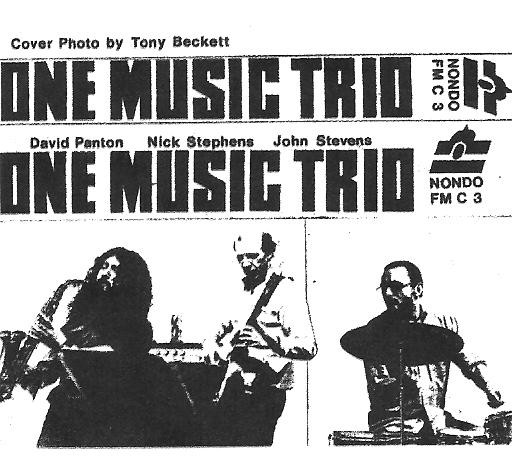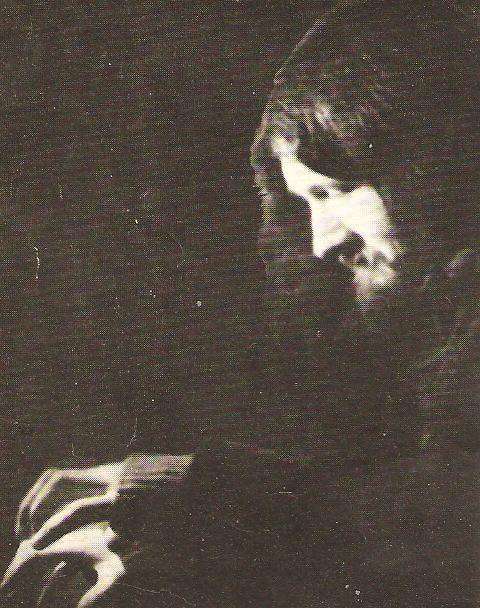
David Panton
David Panton's One Music Trio
Album UK 2012 on Nondo label
Jazz (Avant-garde Jazz)
AUGUST 2012 - (RECORDED)CD/DOWNLOAD RE-ISSUE (with extra tracks - see liner notes below) ONE MUSIC TRIO David Panton - alto saxophone (1,2,4,5)and clarinet (3), Nick Stephens - electric and acoustic bass (1,2,3,4,5), John Stevens - drums (1,2,3,4,5). Tracks: 1 Bypass The Impasse, 2 Blues (January Suite) 3 Snow Blossom Walks (January Suite), 4 Bonjour Madeleine (January Suite), 5 Fanfare For Albert. Recorded at Ted MacDouall's Studio, Ealing, West London 1 January 1981. Extra tracks Recorded at Aston University Centre for the Arts 25 January 1980 6 Dialogue (David Panton - alto saxophone, Terry Parkinson - trumpet), 7 Hiatus (John Adams - guitar, Nigel Phillips - bass guitar. Liner notes to 2012 recordable CD and download release of NONDO FMC3 - One Music Ensemble These trio recordings were made on New Year’s Day 1981 at Ted McDouall’s Studio in Ealing, West London. We all met up at John’s home the previous afternoon and listened to some Webern, as I recall, before heading off to the local pub to meet Ted and eventually, after several drinks, go on to his studio, where we ran over the tunes for the following day’s session, before going our separate ways for the evening festivities. It was the first time I’d seen John for several years and the first time I’d seen Nick since the 1960s, in Birmingham, when he was briefly involved in one of my early short-lived ensembles together with other Midland musicians altoist Jan Steele and drummer Phil Buckle, before heading off to Germany to earn some money playing R‘n‘B around the American air bases. In recent years he’d become a regular in John’s Away and Dance Orchestra projects, becoming both a close musical colleague as well as personal friend, so he was a natural choice for bass when I spoke to John about recording together. The reason for getting together was to finally commit to tape a definitive version of the resultant suite from an Arts Council jazz bursary I’d been awarded in 1979 to compose and record a work in which the marriage of composed and improvised elements would be consummated. The result was the January Suite, a three movement work involving improvisation over chord sequences, amorphous thematic ideas, collective improvisation, free improvisation, jaunty tunes and so on. The suite had been performed and, indeed, recorded (on 25 January 1980 in concert at the Aston University Centre for the Arts) with local musicians with whom I’d worked on and off over the years - Terry Parkinson on trumpet and flugelhorn, John Adams on guitar and Nigel Phillips on bass.* But I wasn’t entirely happy with this sort of chamber music version - on one occasion I remember we all sat on stage grouped around music stands alla a string quartet; it needed more oomph! Nevertheless, this archived version may yet be made available at some point in the future. The suite develops from the post-festive January Blues through the ruminative Snow Blossom Walks (there was an awful lot of snow around in January 1979) before the awakening exuberance of Bonjour Madeleine. The Blues opens with Nick’s solo electric bass setting the mood before the alto and drums enter for the 36-bar theme (12+12+12) which is made up of fragmented riffs over typical blues chord sequences, and these form the basis for solos, before returning to the theme. Snow Blossom Walks has a similar structure ie theme-solos-theme, but here the theme - initially introduced by solo clarinet - relies on its scalic implications to progress the improvisatory development before the obligatory thematic reprise; all peppered by John’s sympathetic brush work. The same is true of Bonjour Madeleine, though it is the rhythmic thrust of the theme - emphasised by John’s opening drum cadenza - which moves the piece forward until the alto is left alone mid-theme before the final ensemble coda brings it to a conclusion. The suite was sandwiched between two other pieces written in 1977. The opener, Bypass The Impasse, is another up-tempo theme-over-chord-sequence, forming the basis for the solos; though here, as elsewhere, since the days of free-form jazz and Eric Dolphy’s work in particular, it is permissible to work both inside and outside the given structure while retaining a sense or feel of it. The closer, Fanfare for Albert, on the other hand, uses a minimalist theme - based on the notes fundamental to all bugle calls, namely the tonic, fifth, and third - before launching off into some very free collective playing before returning to the basic fanfare theme, devices reminiscent of its dedicatee Albert Ayler and hopefully in the same spirit. With hindsight, it would have been interesting to have over-dubbed John on cornet/pocket trumpet to emphasise this more recent link to the tradition. We had all met up again earlier in the day at John’s and though we were not too hung-over his wife drove us to the studio, John dropping off the remnants of the night before in the local bottle bank. After the usual ritual of setting up microphones, checking levels and so on, the session went well with no need for retakes, and the post-session mixing, equalisation and editing process was not the tortured affair it can sometimes become. It was all done and dusted in plenty of time for me to catch my train back to the Midlands and my daytime gig as a musician working in the recreational therapy department of a hospital for (what were then called) the mentally handicapped, before Maggie Thatcher dispersed them into ‘the community’ and we had to refer to them all as people with learning difficulties. The next time we met up was in Birmingham later that year for a gig presented by Birmingham Arts Lab at the Ikon Gallery which coincided with the release of the original cassette. This was only ever going to be an occasional combination, but it’s one that certainly had enough oomph to continue for a while. DP Three tracks from this release were also released on a 7-inch vinyl EP - PM185: Blues, Fanfare for Albert, and Bypass The Impasse. * Two extra tracks by these musicians give a taste of that performance, even though Dialogue and Hiatus were subsequently dropped from the Suite. Dialogue was originally released on Nondo FMC2.
Musicians
 | David Panton as, p, GB album by |
Album Tracks
| No | Title | Artist | Composer | Duration |
|---|---|---|---|---|
| 1 | Bypass The Impasse | David Panton | 6:24 | |
| 2 | Blues (January Suite) | David Panton | 5:17 | |
| 3 | Snow Blossom Walks (January Suite) | David Panton | 7:50 | |
| 4 | Bonjour Madeleine (January Suite) | David Panton | 15:00 | |
| 5 | Fanfare For Albert | David Panton | 4:08 | |
| 6 | Dialogue | David Panton | 2:10 | |
| 7 | Hiatus | David Panton | 3:55 |
